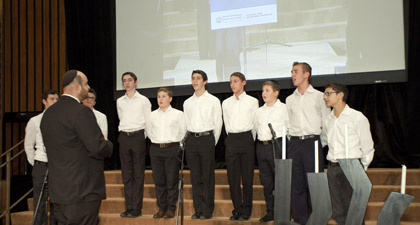The third verse of the second chapter of the Book of Isaiah offers the source for one of Judaism’s most enduring expressions: ki mi-Tzion tetzei Torah, u’devar ha-Shem mi-Yerushalayim (for the Torah will come forth from Zion, the word of God from Jerusalem). Those words, written in the 8th century BCE (probably by the eponymous prophet, and reproduced in the writings of his contemporary, the minor prophet Micah), echo through the ages, declaring the underlying connection between the Jewish homeland and the Jewish scriptures. It’s such a fundamental principle of Judaism that our liturgy cites Isaiah’s words each time we remove the Torah from the Aron Kodesh (Holy Ark).
Little surprise, then, that the phrase has begat a litany of Jewish songs – in the synagogue, of course, but also in the Zionist setlist. Perhaps you’ve heard one or more such renditions yourself at a child or grandchild’s school choir performance. As a young lad, I myself sang those exact words in precisely such a setting – to hilariously disastrous effect. So when my daughter, who’s been getting involved in her school choir, recently asked if I’d ever been in one myself, boy, did I have a story to tell.
It may surprise you to learn that there was a time in the late 1980s and early ‘90s when my vocal chords were in demand for Jewish choirs of all varieties – schools, shuls, camps, you name it. It is especially surprising given the catastrophe of my first foray. On that day, in the school gymnasium, with all the students and parents watching, I stepped to the front of the room. The song was “Ki mi-Tzion,” and I sang the solo for “U’devar ha-Shem mi-Yerushalayim.”
Well, not really sang. If we’re being entirely honest, I actually burst out laughing midway through and didn’t even stop when the rest of the class came back in to rescue me. One of my classmates, today a professor of Jewish history south of the border, nudged me from his spot in the line, but to no avail. I was so nervous – I can still remember how nervous I was – that I froze, simple as that. Hey, at least I laughed instead of crying.
But that’s only half the reason why the performance maintains legendary status in my family. The other portion comes courtesy of my father, who borrowed a camcorder (my uncle’s, if I remember correctly) to record the events for posterity. Not only did he catch my unfortunate maiden gig in all its glory, he somehow managed to compound it. You see, my father had never handled a video recording device before – he only had experience with cameras. You can rotate a camera from a horizontal position to a vertical one, and voilà, you get a different perspective. Same thing with the camcorder, right?
So it was that when the family sat down to watch that dumpster fire of a tape, we found ourselves forced to manipulate our necks in the most unnatural of directions, as the video tilted sideways, then completely upside down. The medium was indeed the message that day.
READ: FROM YONI’S DESK: TURMOIL IN IRAN RENEWS NEED FOR CANADIAN ACTION
Amazingly enough, after all was said and done, I actually ended up being in a bunch more choirs – and even managed to get through a couple of solos without giggling – until nature inevitably took its course and I could no longer hit the high notes (or really any notes). Perhaps even more astoundingly, in the intervening years, technology has in fact caught up to my father’s vision of how a video recording device ought to operate.
